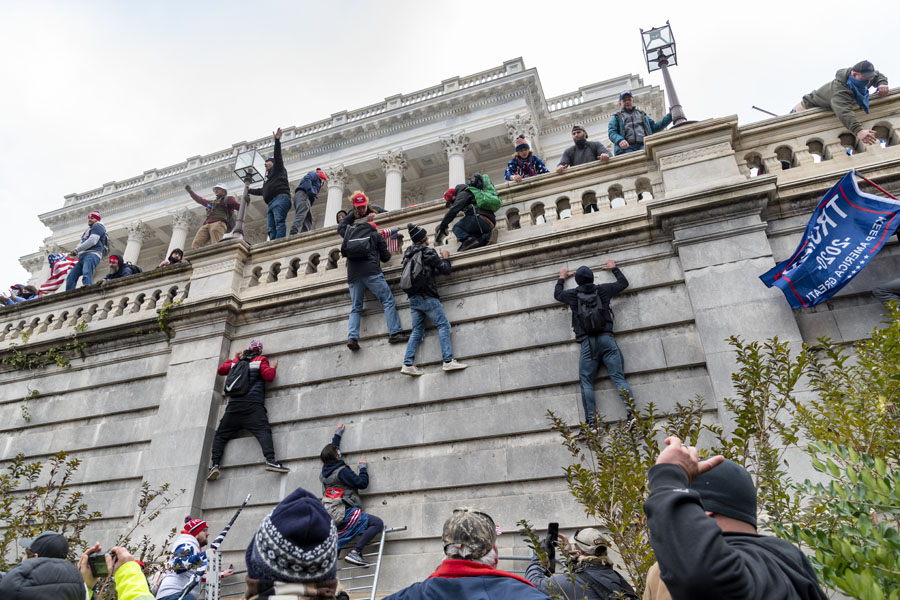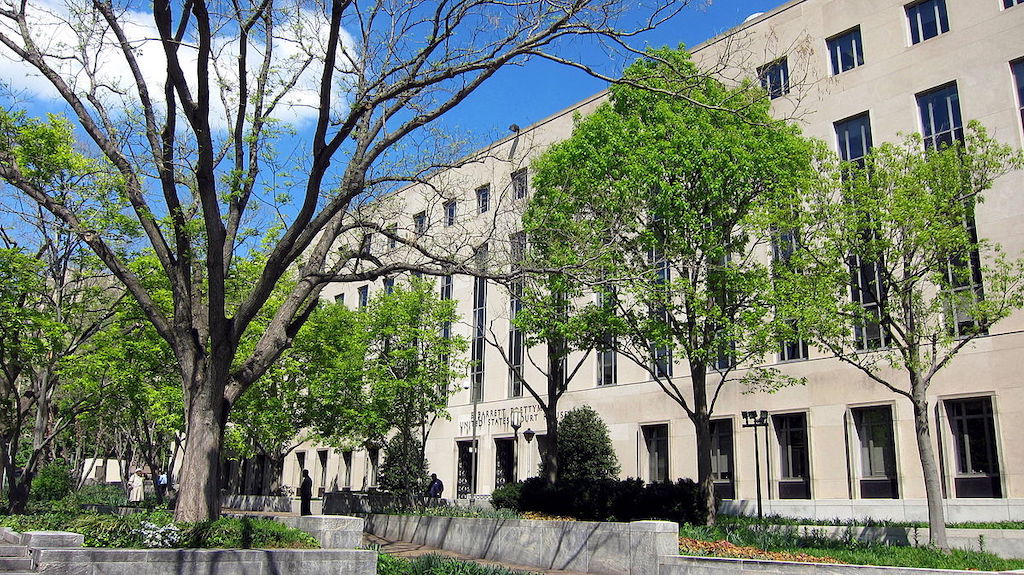The Jan. 6 Investigation Is Ramping Up. Will It Matter?
The House select committee on the Jan. 6 attack has set out to uncover an enormous amount of information with significant obstacles to overcome in the process. With so much to cover in such little time, one committee investigation won't be enough to answer all the unresolved questions.

Published by The Lawfare Institute
in Cooperation With

In July, the House select committee on the Jan. 6 attack started its work with a headline-grabbing hearing, featuring testimony from law enforcement officers present at the Capitol during the attempted insurrection. Since then, the committee has yet to hold another hearing—but that doesn’t mean it isn’t getting things done behind the scenes. Over the past month, investigators have sent out a string of subpoenas to Trump advisers and allies, calls for documents from government agencies, and requests for telecommunications companies to preserve phone records. The committee announced in early September that it had already received “thousands of pages of documents”—and according to Chairman Bennie Thompson, at least some witnesses are cooperating so far, including former Department of Justice official Richard Donoghue, who was involved in pushing back against Trump’s efforts to overturn the election. The investigation, it seems, is moving forward.
But even as investigators build up momentum, some significant obstacles lie ahead. The committee has an enormous pile of information to dig into—some of it of potentially dubious value—and no end of questions to pursue about what happened on Jan. 6 and in the days, weeks, and years before. In doing so, it is likely to run into legal disputes over its ability to obtain information from recalcitrant witnesses close to former President Trump—along with information that Trump might object to releasing on the grounds of executive privilege. And Thompson has said he hopes to finish the investigation by the “early spring” of 2022. So the clock is ticking—and there’s a lot to get done.
Committee investigators have been busily seeking out information on a range of topics, with their strategy becoming clearer since Congress returned from its August recess. They began with a slate of requests to executive branch agencies from the Pentagon to the Department of the Interior, asking for material on Trump’s effort to overturn the 2020 election and government preparations—or lack thereof—for Jan. 6. These requests built on inquiries made to agencies by other committees earlier this year.
But the committee saved its widest request for the National Archives and Records Administration (NARA)—which preserves government records—seeking a vast swath of presidential documents on Trump administration communications regarding Jan. 6 and the 2020 election. Politico reports that the committee has begun receiving material from the executive branch, and NARA is working through the steps required to identify and transmit records to congressional investigators. According to the Washington Post, the Biden administration “plans to err on the side of disclosure” in allowing the release of records potentially covered by executive privilege, “given the gravity of the events of Jan. 6”—though Trump has insisted that “[e]xecutive privilege will be defended.” It’s not clear to what extent Trump’s opinion on this matters, but he can certainly hold things up in court.
In some cases, the committee has jumped straight to subpoenas, demanding records and testimony from Trump’s former chief of staff Mark Meadows, deputy chief of staff Dan Scavino, longtime Trump administration official Kash Patel and outside Trump advisor Steve Bannon. It also subpoenaed a number of people involved in organizing Jan. 6 protests at the Ellipse, just outside the White House, and at the Capitol—including a current Republican House staffer. It’s asked that telecommunications companies preserve phone records from a range of Trump associates and family members and, notably, a number of Republican members of the House of Representatives. And it has sent requests to social media companies—mainstream platforms like Facebook and YouTube, and fringe right-wing sites such as Parler and Gab—for data on election misinformation and planning for the Jan. 6 rallies. Rep. Adam Schiff, who sits on the committee, announced recently that he and his fellow members will also seek to hear from Facebook whistleblower Frances Haugen on the platform’s role in the Capitol riot.
All this adds up to a fairly aggressive and wide-reaching approach by the committee. Congress typically asks for voluntary compliance from even unfriendly witnesses before sending out subpoenas, and the decision to skip straight to a subpoena speaks to a willingness to play hardball with Trump associates in order to move quickly—and publicly, rather than behind closed doors. Speaking to Politico, Schiff explained that the committee plans to “forgo some of the time-consuming steps” that have bogged down congressional investigations in the past. Likewise, the choice to seek information about Trump’s communications—and from his close associates—shows that the committee isn’t trying to tiptoe around the former president.
So far, the committee’s approach may be working in producing useful details. Thompson said recently that the committee is busy sorting through “so much information” that “there might not be a need for an immediate hearing” any time soon: “[W]e’re getting a lot of stuff that we didn’t know about.” Not only does this suggest that the committee is obtaining potentially useful information, but it illustrates one of the realities of congressional oversight: that televised hearings, while important for constructing a narrative and getting high-profile witnesses on the record, are often not the most effective tool for uncovering new facts.
The reported willingness by the White House to share with Congress at least some material potentially covered by executive privilege is also good news for the committee’s efforts. There was a risk that the committee would soft-pedal its work in a misguided attempt to appeal to pro-Trump Republicans in Congress or among the public, or that the Biden administration would block the release of all documents on the grounds of executive privilege. Luckily, neither Congress nor the executive seems to be taking these approaches.
However aggressively the committee pursues its work, though, the path forward will not be a smooth one. Difficulties are already starting to pop up—and the true determinants of the committee’s success will be in how it handles these problems.
First, there is the issue of executive privilege. Even though he’s no longer in office, Trump has the ability to cause a legal ruckus by invoking the privilege over documents held by NARA and the testimony of his former advisers. And even if he’s unable to ultimately prevent the release of information to Congress, he can still generate quite a delay. As Jonathan David Shaub explains in Lawfare, the Supreme Court’s ruling in Nixon v. Administrator of General Services establishes that “a former president may also be heard to assert” executive privilege, though it remains murky what would happen if a former president seeks to assert the privilege over the disagreement of the current president, as would be the case here.
Trump, for his part, says he plans to raise objections to the committee’s investigation. In a statement released after the committee subpoenaed Meadows, Scavino, Patel, and Bannon, he declared, “We will fight the subpoenas on executive privilege and other grounds, for the good of our country. We wait to find out whether or not subpoenas will be sent out to antifa and BLM for the death and destruction they have caused in tearing apart our Democrat-run cities throughout America.” Politico reports that the four subpoena recipients plan to defy the committee’s orders on Trump’s request—though it’s hard to tell how Bannon would claim executive privilege, given that he last held a government position in 2017 and, at the time of the Jan. 6 riot, was hosting a podcast. (This is not the first time Trump has asserted executive privilege in relation to individuals outside of government, though it may be the first time he’s done so for a podcaster.)
This raises potential issues for both the committee’s outreach to the executive branch and its subpoenas and requests to individual witnesses, particularly those who would have reason to put up a fight. As Shaub writes, the specific contours of the problem will depend on what information Trump and his associates seek to block. The Presidential Records Act requires NARA to notify and consult Trump on which records it plans to release, but ultimately the statute leaves the decision of what to release to the current president. Requests to executive branch agencies, however, don’t require that consultation with the former president—so that might be an easier way for the committee to get a hold of records, at least if the Biden administration agrees to hand them over. Meanwhile, subpoenas to former Trump administration officials could get held up if the witnesses claim testimonial immunity—the doctrine, derived from the idea of executive privilege, that close presidential advisers need not comply with congressional requests for information.
If witnesses do refuse to comply, the committee will have to decide how to go about enforcing its subpoenas. Faced with similar recalcitrance during the Trump administration, the House of Representatives turned to civil enforcement, requesting help from the courts in forcing witnesses to testify. That strategy proved largely unsuccessful: Trump was able to run out the clock as his advisers, such as former White House counsel Don McGahn, simply dragged out litigation past the end of his presidency through what felt like an endless cycle of appeals. And even if the Jan. 6 committee were to attempt civil enforcement, such efforts are on uncertain legal territory after the August 2020 panel decision by the U.S. Court of Appeals for the D.C. Circuit in Committee on the Judiciary v. McGahn, which held that the House lacked a cause of action to bring McGahn to court. While the en banc D.C. Circuit court vacated the August opinion after the case was ultimately settled earlier this year, McGahn left a number of issues unresolved that could bog down an effort to enforce subpoenas through civil litigation.
Perhaps for this reason, members of the committee have talked less about civil enforcement and more about the possibility of prosecuting stubborn witnesses for contempt of Congress. Under the criminal contempt statute, noncompliance with a subpoena from a congressional committee for testimony or documents is a misdemeanor carrying a penalty of a fine or up to a year in prison. Multiple members of the Jan. 6 committee, including Thompson, have said they would turn to this option if necessary: “[A]s a reminder,” Rep. Jamie Raskin tweeted about potential defiance by Bannon and his fellow subpoena recipients, “noncompliance with Congress invites criminal sanctions.”
Using the criminal contempt process to punish recalcitrant witnesses has, however, presented various challenges in the past. First among these is that doing so requires the assistance of the executive branch. Once one chamber of Congress approves a contempt citation, the next step is for a U.S. attorney from the Department of Justice to bring the case to a grand jury. Under practices outlined in a 1984 Office of Legal Counsel opinion, the executive branch has refused to pursue prosecution under the criminal contempt statute against individuals whose noncompliance is at the direction of the current president on the grounds of executive privilege or claims of testimonial immunity.
High-profile examples of the executive branch refusing to prosecute a criminal contempt citation by Congress have occurred when the president directing the behavior in question was still in office, such as when Congress held Attorney General William Barr and Commerce Secretary Wilbur Ross in contempt over their refusal to turn over documents regarding the Trump administration’s decision to add a citizenship question to the U.S. Census in 2019. If Bannon and his cohort refuse to comply with subpoenas at Trump’s direction, the Justice Department, now helmed by Attorney General Merrick Garland, may choose to prosecute any contempt citations referred to it. But before those prosecutions could begin, the full committee would need to report out the contempt citations and the full House would likely need to vote to refer them to the U.S. attorney.
All this will take time. Even if the Department of Justice is willing to prosecute recalcitrant witnesses who have been held by the House or Senate to be in contempt, and that prosecution proceeds without intervening interruption over issues of executive privilege or otherwise, there is no guarantee that doing so will produce the documents and testimony the committee is seeking. Cooperation after the House or Senate holds an individual in contempt does not automatically resolve the charges against him or her, potentially reducing the incentive to cooperate at all at that point. In other words, looming criminal contempt citations over uncooperative witnesses might make for better theater than actual leverage on the committee’s part. In the case of the Trump associates who have been issued subpoenas so far, being taken to court for noncompliance might be seen as a useful political project, at least in the short term. Whether the individuals in question would ultimately be willing to incur punishment to maintain their loyalty to Trump is a different question. But the chances of a drawn-out process to resolve criminal citations are high.
And even if the committee opts not to pursue civil enforcement, other speed bumps might lay ahead. Trump could also sue to prevent the National Archives from releasing material he argues is privileged, even if the Biden administration permits the Archives to pass the records to Congress. “Trump’s arguments would likely not succeed,” Shaub argues. “But such a suit could potentially tie the archivist’s hands and prevent the disclosure of information to the committee for a substantial period of time.”
And there may be additional hiccups when it comes to obtaining information from private entities. Some social media companies, like Facebook, may be only too happy to comply with the committee’s requests in order to build congressional goodwill in an otherwise inhospitable political environment for Silicon Valley. Other platforms, though, might be less eager to hand over data, for privacy reasons or otherwise. Likewise, if and when the committee asks telecommunications companies to transmit the phone records it has requested they preserve, it could potentially run into resistance either from the companies themselves or from the members of Congress and Trump associates whose data is at issue. It’s not hard to imagine, say, Rep. Jim Jordan or Rep. Marjorie Taylor Greene suing AT&T to prevent their records from being transmitted to the committee.
Apart from these potential delays, the committee faces the problem of how to focus a sprawling investigation. The House authorization creating the select committee grants it a vast mandate—its purpose, among other things, is to “investigate and report upon the facts and causes” of the Jan. 6 attack, “including facts and causes relating to the preparedness and response of ... law enforcement in the National Capitol Region ... as well as the influencing factors that fomented such attack on American representative democracy while engaged in a constitutional process.” Given the sheer amount that remains unknown about what happened on Jan. 6 and the number of documents the committee has requested, there are many ways to structure such a probe, and many different rabbit holes that investigators could peer into.
Politico reports that “[t]he panel is attempting to piece together Trump’s pre-Jan. 6 efforts to overturn his election loss, his attempt to mobilize the Justice Department in support of that crusade and the thinking behind his effort to call supporters to Washington on the day Congress gathers to certify presidential election results.” That’s consistent with recent news that Richard Donoghue, the acting deputy attorney general at the time of the insurrection, sat for an interview with the committee. And the committee seems to be interested in the role that social media platforms, most prominently Facebook, might have played in allowing rioters to organize.
But that’s not all. According to Politico, “Also on the panel's to-do list is exploring reforms to the Electoral Count Act”—the statute that governs Congress’s convening to certify the electoral vote, which the Jan. 6 rioters sought to break up in order to keep Trump in office. A number of experts have advocated reforming the Electoral Count Act to forestall future attempts to overturn elections. This might seem a bit far afield from the Jan. 6 committee’s core mission—but tying the investigators’ work to statutory reform could be a useful way to shore up the committee’s legal position in pursuing information. Courts have often deferred to committees in disputes over whether a subpoena has a valid “legislative purpose,” but the Supreme Court’s ruling in Trump v. Mazars suggests a heightened level of interest by the judiciary in interrogating whether congressional investigations meet this standard. After Mazars, Congress has reason to be more careful in crafting its requests for information so that they hold up in court. Though the case concerned only subpoenas for personal information of the president, it arguably left the door open to more sustained judicial inquiry into the purpose and constitutionality of congressional probes, and tying the Jan. 6 investigation to Electoral Count Act reform might help the committee protect itself against legal challenges on these grounds.
Another potential legislative hook, should the committee want it, would involve reforms to the Capitol Police and improvements to the security of the Capitol complex, both of which are issues that Congress can address through legislation. As we’ve written, the failure of the Capitol Police to protect Congress on Jan. 6—what happened, and what caused it—remains a major outstanding question. It’s not hard to imagine how the committee could link its investigation to the need to make the Capitol safer. A report from two Senate committees offered a set of proposed changes in June, and the select committee could review these ideas and offer others.
Yet the fact that so many questions remain unanswered about Jan. 6 means that the committee will have to leave some things out. Given that members haven’t played up the role of Capitol Police governance in their recent public comments, might that line of investigation fall by the wayside? There is also the matter of intelligence failures by agencies, including the FBI and the Department of Homeland Security, in the days and weeks before the riot, which the committee addressed in some of its early requests to the executive branch but hasn’t addressed recently in public remarks.
Under any circumstances, members would have to choose how to focus their efforts—including between investigating and proposing reforms. But focus is particularly crucial here, because the clock is ticking—and quickly. Thompson has said that he plans for the committee to wrap up its work in the spring of 2022, which leaves only a handful of months for investigators to resolve disputes with witnesses. And at an absolute maximum, the committee can only count on having time through the end of 2022. If the Republican Party regains control of the House, as seems likely, the new speaker would presumably be uninterested in continuing the committee’s work.
That means that Trump, his associates, and other potentially recalcitrant witnesses will have time on their side in any litigation: Once again, they may be able to simply run out the clock. For the same reason, the committee has an incentive to concentrate on specific, narrow areas of inquiry, on which it can pursue information aggressively in order to speed things up.
The House created a select committee to investigate Jan. 6 in order to focus investigations of the insurrection under one body responsible for telling the story of that day. That’s a laudable goal, and so far the committee’s members seem willing to push hard to accomplish it. At the same time, the compressed timeframe of their work, along with the sheer range of unresolved questions about what happened on Jan. 6 and why—and what Congress can and should do to prevent it from happening again—means that one committee can’t possibly do it all. The Jan. 6 committee’s work should be the beginning, not the end, of the legislature’s response to the insurrection. Congress needs to consider what to do about issues laid bare by Jan. 6, from the small—like nonreinforced windows at the Capitol that were easily smashed by rioters—to the large, such as racially motivated domestic violent extremism. A focused, effective committee investigation is necessary, but not sufficient.





